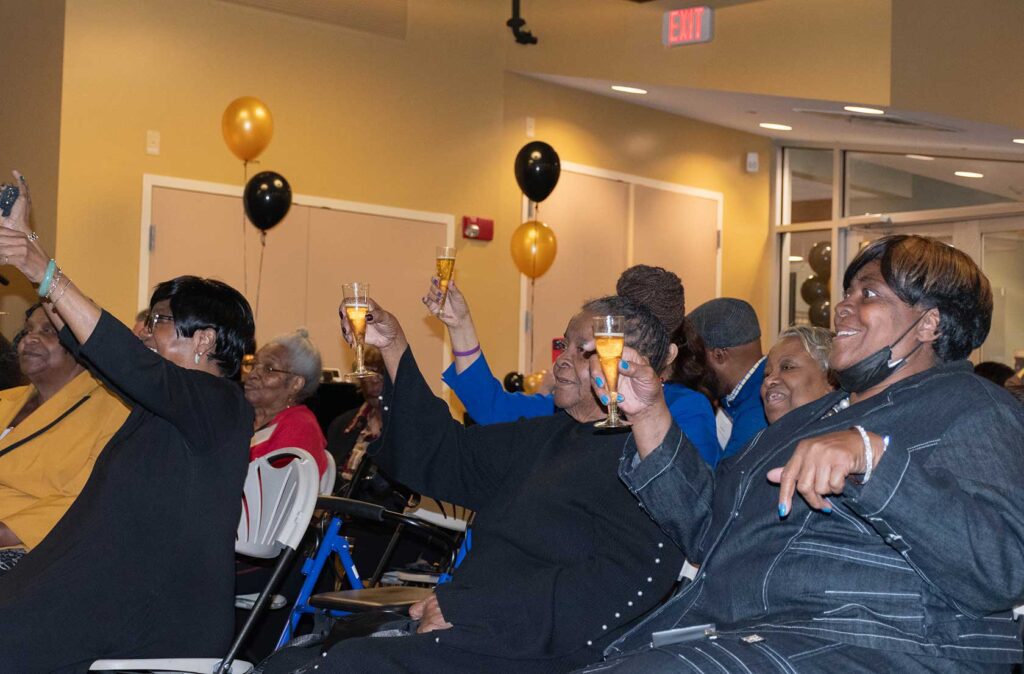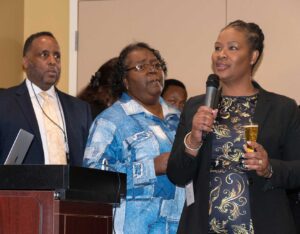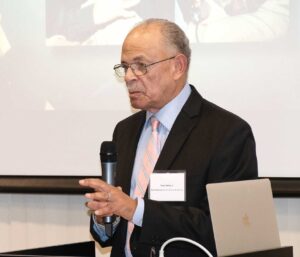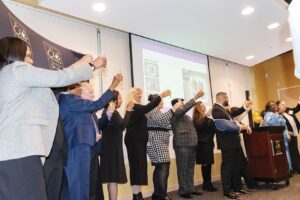
In a room strewn with black and gold balloons, staff and clients from Central Boston Elder Services celebrated the organization’s 50th anniversary.
With a sparkling-cider toast, the state’s only minority-run eldercare agency marked the kick-off of preparations for a gala and expo and an ambitious fundraising season, as it looked back on its legacy.

Sylvia Exantus (right), executive director of Central Boston Elder Services, delivers a toast celebrating staff of the organization
as it celebrates its 50th anniversary. BANNER PHOTO
“We have empowered our seniors to age in place with dignity and grace in the communities that they’ve helped to build. We owe them nothing less,” said Sylvia Exantus, executive director of the organization, headquartered in Nubian Square, at the March 28 reception.
CBES’s 50 years of work are especially important to Boston’s communities of color. More than half of the organization’s clients identify as a minority and nearly a third are non-English speakers — the highest proportions of any of the 27 eldercare agencies in the state.
The agency works to connect community elders and people with disabilities with health services, digital learning and financial support to help them live with independence.
Royal Bolling Jr., who heads the organization’s board, said the anniversary is an opportunity to recognize CBES’s longstanding mission to support elder independence, even if how the organization looks and runs might shift over the next 50 years.

Royal Bolling Jr., president of the board of directors of Central Boston Elder Services, speaks at the reception. In his remarks, he said as the organization marks its milestone, he’s confident it still is serving the mission it set out to in 1974. BANNER PHOTO
“Things are going to be different; faces are going to be different; demands are going to be different; priorities are going to be different — but the mission, the goal of Central Boston must remain,” he said in remarks at the event.
That mission is one of concern and love, Bolling said later in an interview, looking back to the organization’s roots, when, in 1974, a group of community members at Ebenezer Baptist Church banded together to help serve local elders in need.
Emily Shea, who heads the city’s Age Strong Commission, said the team at CBES is an important part of a network that comes together to support Boston’s older residents.
“It really takes a village, I think, to make sure that people can live and age well in our city,” Shea said. “We want everyone to be able to age with dignity and to be able to age with the supports that they need.”
The past 50 years have not always been an easy road. Catherine Hardaway, the former executive director of CBES, said there were times where they were challenged by tight budgets or had to wait to learn how much state funding they’d receive.

Central Boston Elder Services staff toast at a reception celebrating the organization’s 50th anniversary March 28. The agency has grown from serving about 200 people when it started to almost 10,000 clients today.
Bolling, who has been on the organization’s board for about 20 years, recalled a time early in his tenure when state revenues were lower than expected, limiting the funding that CBES received. As a result, the organization had to cut back and restructure programs to be able to survive.
“I just couldn’t see light at the end of the tunnel,” he said. “And I said we may have to reconsider what we’re doing, and is this sustainable?”
In the early 2000s, during Hardaway’s tenure, the center had to move out of its offices at 812 Huntington Ave., when the landlord was requesting about half a million dollars in rent.
But still, it managed to grow. CBES in 2011 purchased the building at 2315 Washington Street where it now is based and created 57 units of elder housing in the building next door, now named after Hardaway, who pushed to see it built.
She said seeing the organization get to 50 years meant a lot.
“Most organizations start out, but they don’t survive,” she said. “For this agency to have survived for as long as it has means that you had people who were employed who really care about this agency.”
What started as an organization serving about 200 people in 1974 — a group referred to as “the Originals” — now serves nearly 10,000 clients.
“We have accomplished much, but it is not enough,” Exantus said in remarks. “We are thankful for the state and federal funds we receive to provide essential support services to our seniors, helping to keep them out of costly nursing facilities, but more funding is needed.”
As part of the 50th anniversary celebrations, the organization is aiming to raise $400,000 to support augmenting and expanding the programming it offers.
Exantus pointed to the work the organization does around digital equity and literacy, decreasing social isolation and its Little Necessities Program, which connects clients with funds to purchase things from canes and walkers to clothes to air conditioning units.
Shea said the Age Strong commission regularly directs people to the Little Necessities fund.
“It’s those types of one-off things that this fund is so critical for, to make sure that people have what they need to age well in our city,” she said.
CBES’s fundraising efforts will build to October, when the organization plans to host its “Golden Era” gala to celebrate the anniversary.
Exantus said the time between now and then is an opportunity to celebrate not only the legacy of the organization, but also the staff that has made it possible. She acknowledged the team as she raised a glass at the reception.
“This is a great team of people who have really dedicated themselves to Central Boston. … I know the work is hard; often we’re faced with many challenges, but you guys always step up,” Exantus said in her toast. “I just want to thank each and every one of you from the bottom of my heart.”






